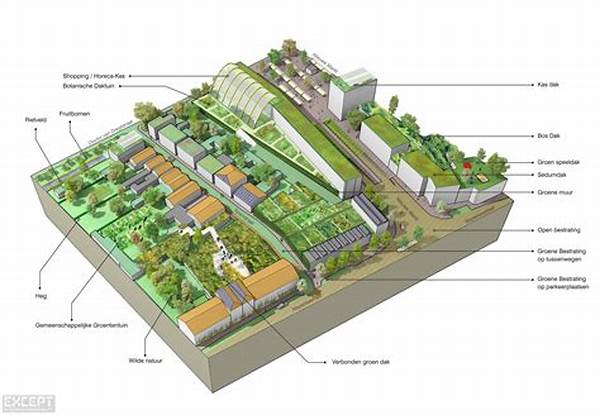The rapid urbanization and ecological challenges of our time demand a transformative approach to the way we design our cities. The solution lies in sustainable urban design concepts, a visionary framework that not only enhances the quality of life but also safeguards our planet for future generations. Imagine living in a city where green spaces are abundant, where transportation is efficient and eco-friendly, and where energy consumption is minimized without compromising on comfort. It’s not just a utopian dream; it’s a tangible future achievable through sustainable urban design concepts.
Read Now : High-end Suite Decoration Ideas
The Essence of Sustainable Urban Design
Sustainable urban design concepts encompass a wide range of strategies aimed at creating cities that are livable, resilient, and environmentally friendly. Consider the impact of green architecture, which integrates natural elements into building designs, reducing energy consumption while improving air quality. Imagine how these principles can transform hard, gray cityscapes into lush, vibrant communities that prioritize human well-being. Moreover, sustainable urban design concepts promote public spaces that invite social interaction, fostering a sense of community and belonging. These designs ensure the efficient use of resources, which means less waste, lower costs, and a reduced urban carbon footprint. As cities continue to expand, adopting sustainable urban design concepts becomes not just beneficial, but essential for a prosperous future.
Emphasizing transit-oriented development is another crucial element of sustainable urban design concepts. By focusing on these designs, cities can reduce their dependency on cars, cutting down on emissions and traffic congestion. This approach not only encourages people to walk, cycle, or use public transport but also increases accessibility to services and amenities, enhancing the quality of urban life significantly. By prioritizing accessibility and reducing the urban heat island effect through strategic tree planting and reflective materials, sustainable urban design concepts make cities more enjoyable and healthier places to live.
Sustainable urban design concepts are our gateway to resilient cities, capable of withstanding the effects of climate change. They support the incorporation of renewable energy sources and ensure that our urban environments are adaptable and robust in the face of environmental challenges. Isn’t it time we embrace a future where our cities are not just places to live, but thriving ecosystems that nurture people and nature alike? Sustainable urban design concepts make this future possible, beckoning us to prioritize long-term sustainability over short-term convenience.
Key Principles of Sustainable Urban Design Concepts
1. Integration with Nature: Sustainable urban design concepts prioritize green spaces and biodiversity, offering citizens the joy and health benefits of being in close contact with nature.
2. Efficient Energy Use: Embracing renewable energy resources and energy-saving technologies is at the heart of sustainable urban design concepts, promoting sustainability and reducing ecological footprints.
3. Waste Reduction: By incorporating recycling, upcycling, and waste-to-resource programs, sustainable urban design concepts minimize the impact of waste on our environment.
4. Water Management: Efficient and innovative water management strategies ensure the availability of clean water, a vital component of sustainable urban design concepts.
5. Inclusive Planning: Sustainable urban design concepts focus on inclusivity, ensuring accessible and affordable spaces for all citizens, regardless of their socioeconomic status.
The Impact of Sustainable Urban Design on Urban Mobility
Mobility is a fundamental aspect that sustainable urban design concepts are poised to revolutionize. By fostering walkable neighborhoods and developing efficient public transport networks, cities can shift away from car-centric planning, which is costly and environmentally damaging. Imagine the reduction in air pollution and noise, resulting in a more pleasant urban experience for pedestrians and cyclists. Sustainable urban design concepts provide solutions that not only address traffic woes but also rejuvenate communities, making them interconnected and lively places.
Enhanced urban mobility through sustainable urban design concepts transforms how we interact with our cities daily. It presents opportunities for smart mobility solutions such as electric buses, bike-sharing programs, and pedestrian-friendly streets that make commuting cleaner and more accessible. Cities that adopt these strategies do not just solve mobility issues; they spearhead a movement toward healthier, more active lifestyles. The interlinked nature of sustainable urban design concepts and urban mobility catalyzes a ripple effect that enhances overall urban quality of life and environmental health.
Read Now : Elegantly Simple Furniture Styles
Incorporating Technology in Sustainable Urban Design
The fusion of technology with sustainable urban design concepts marks the dawn of a new era for urban planning. Smart city solutions, like sensors and data analytics, optimize energy use, transportation, and service provision, creating more responsive and efficient urban environments. Sustainable urban design concepts harness technological advancements to craft cities that are not only sustainable but also smarter, adapting swiftly to the needs of their residents and the planet.
The potential for real-time data to improve the sustainability of cities is enormous. Imagine having dynamic traffic systems that reduce congestion and pollution or automated systems that optimize water and waste management. These innovations are part and parcel of sustainable urban design concepts, driving cities toward a future where technology and sustainability go hand in hand. As these concepts are integrated, our urban environments become progressively smarter, leading to significant improvements in both livability and efficiency.
Embracing A Sustainable Urban Future
Our cities stand on the brink of transformation, and sustainable urban design concepts hold the key. These forward-thinking principles push the boundary of what is possible, allowing urban spaces to become pioneers in environmental stewardship. From eco-friendly public transportation systems to green building practices and community-centric urban layouts, sustainable urban design concepts propose actionable methods to revolutionize our urban landscapes. Imagine living in a city with clean air, abundant greenery, and smart infrastructure that promotes healthy and vibrant living.
As we strive toward a sustainable urban future, embracing sustainable urban design concepts becomes imperative. These concepts are not just theoretical solutions; they are actionable and impactful, leading the way to cities that prioritize both their inhabitants and the planet. Through cooperation among policymakers, urban planners, and communities, we can instill these transformative ideals, constructing urban areas that are models of sustainability, resilience, and inclusion for all.
The Role of Policy in Promoting Sustainable Urban Design Concepts
Policy plays a critical role in the widespread adoption of sustainable urban design concepts. Governing bodies must champion regulations and incentives that support green building, sustainable transportation initiatives, and conservation efforts within urban planning. By aligning policies with the goals of sustainable urban design concepts, lawmakers can create an environment where eco-friendly urban living is the standard, not the exception.
Government incentives for sustainable practices can accelerate the transition to greener cities. These could include tax credits for energy-efficient buildings, subsidies for public transportation projects, and grants for green infrastructure. Encouragement from the policy level ensures that sustainable urban design concepts become integral to city development plans, propelling a sustainable and innovative urban future.
Summarizing the Promise of Sustainable Urban Design Concepts
Sustainable urban design concepts envision a future where cities thrive in harmony with nature, while delivering on economic and social fronts as well. These concepts emphasize eco-friendly infrastructure, renewable energy use, and green public spaces that together work to reduce the adverse impacts of urbanization. By fostering healthier, more equitable communities, sustainable urban design concepts present a roadmap to not just survive, but flourish in the challenges posed by urban expansion.
Furthermore, sustainable urban design concepts unlock the potential for innovation and cooperation among stakeholders of diverse backgrounds. As cities incorporate these principles, they transition into dynamic ecosystems that nurture economic growth, societal well-being, and environmental integrity. The message is clear: adopting sustainable urban design concepts is not simply beneficial; it is essential for a viable and vibrant urban future. Now is the time to champion these transformational ideas, ensuring that our cities are places of both prosperity and sustainability.





